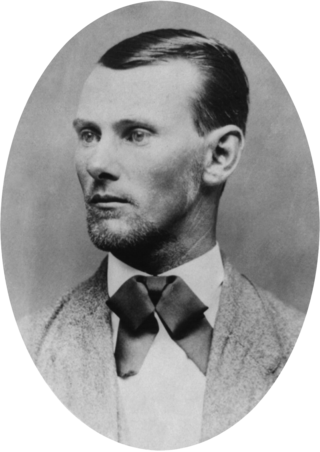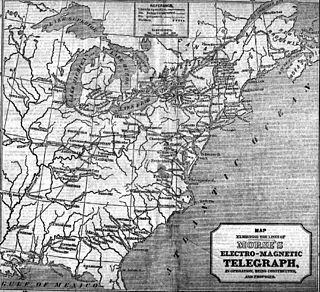Related Research Articles

The Pony Express was an American express mail service that used relays of horse-mounted riders. It operated from April 3, 1860, to October 26, 1861, between Missouri and California. It was operated by the Central Overland California and Pikes Peak Express Company.

St. Joseph is a city in Andrew and Buchanan counties and the county seat of Buchanan County, Missouri, United States. Located on the Missouri River, it is the principal city of the St. Joseph Metropolitan Statistical Area, which includes Buchanan, Andrew, and DeKalb counties in Missouri and Doniphan County, Kansas. As of the 2020 census, St. Joseph had a total population of 72,473, making it the 8th most populous city in the state, and the 3rd most populous in Northwest Missouri. St. Joseph is located roughly thirty miles north of the Kansas City, Missouri, city limits and approximately 125 miles (201 km) south of Omaha, Nebraska.

The San Antonio Express-News is a daily newspaper in San Antonio, Texas. It is owned by the Hearst Corporation and has offices in San Antonio and Austin, Texas. The Express-News is the third largest newspaper in the state of Texas, with a daily circulation of nearly 100,000 copies in 2016. The newspaper's online presence includes both the subscription version of the San Antonio Express-News and the ad-supported mySA.

The Central Overland California and Pike's Peak Express Company was a stagecoach line that operated in the American West in the early 1860s, but it is most well known as the parent company of the Pony Express. It was formed as a subsidiary of the freighting company Russell, Majors, and Waddell, after the latter two partners bought out Russell's stage line, the Leavenworth and Pikes Peak Express Company. The stage line had made its first journey from Westport, Missouri, to Denver on March 9, 1859.

William Hepburn Russell (1812–1872) was a United States businessman. He was a partner, along with Alexander Majors and William B. Waddell, in the freighting firm Russell, Majors, and Waddell and the stagecoach company the Central Overland California and Pikes Peak Express Company which was the parent company of the Pony Express. His public life is one of numerous business ventures, some successful and some failed. While Russell, described as a good-looking man, lived the majority of his life on the edge on the western frontier, he was always more at home in the upper-class settings of the East coast.
The St. Louis Globe-Democrat was originally a daily print newspaper based in St. Louis, Missouri, from 1852 until 1986. When the trademark registration on the name expired, it was then used as an unrelated free historically themed paper.

The News-Press & Gazette Company (NPG) is a media company based in St. Joseph, Missouri, wholly owned and operated by the Bradley family. It is presided by Brian Bradley and David R. Bradley, with Hank Bradley (retired), Eric Bradley and Kit Bradley serving on its board of directors. All are descendants of family patriarch Henry D. Bradley and his son, David Bradley, Sr.

Mount Mora Cemetery is the oldest public cemetery in St. Joseph, Missouri. Among those who are buried in the cemetery are three governors, a U.S. senator, soldiers from both sides in the American Civil War and riders of the Pony Express. In October 2006, several headstones including that of Missouri governor Silas Woodson were damaged by vandals.
Francis Marion Posegate (1838–1917), American Civil War soldier, journalist, and mayor of St. Joseph, Missouri from 1882 to 1884.
The Pantagraph is a daily newspaper that serves Bloomington–Normal, Illinois, along with 60 communities and eight counties in the Central Illinois area. Its headquarters are in Bloomington and it is owned by Lee Enterprises. The name is derived from the Greek words "panta" and "grapho," which has a combined meaning of "write all things."
William Fahnestock Ridenbaugh was a newspaper publisher who started the St. Joseph Gazette in St. Joseph, Missouri.
The St. Joseph News-Press is a daily morning newspaper based in St. Joseph, Missouri. It is the flagship publication of the News-Press & Gazette Company, which owns newspapers across northwestern Missouri and northeastern Kansas, and television and radio stations throughout the western United States.

Christian Ludwig Rutt was a managing editor for the St. Joseph News-Press who is credited with coming up with the recipe and name for Aunt Jemima pancakes.

Henry D. Bradley was a publisher of the St. Joseph News-Press who was the first member of the Bradly family which controls the News-Press & Gazette Company media company.

Jesse Woodson James was an American outlaw, bank and train robber, guerrilla and leader of the James–Younger Gang. Raised in the "Little Dixie" area of Western Missouri, James and his family maintained strong Southern sympathies. He and his brother Frank James joined pro-Confederate guerrillas known as "bushwhackers" operating in Missouri and Kansas during the American Civil War. As followers of William Quantrill and "Bloody Bill" Anderson, they were accused of committing atrocities against Union soldiers and civilian abolitionists, including the Centralia Massacre in 1864.

The New York Evening Express (1836–1881) was a 19th-century American newspaper published in New York City.

The timeline of North American telegraphy is a chronology of notable events in the history of the electric telegraphy in the United States and Canada, including the rapid spread of telegraphic communications starting from 1844 and completion of the first transcontinental telegraph line in 1861.
Charles Lewis Gruneisen (1806–1879) was an English journalist and musical critic.

Bela Metcalfe Hughes was an American lawyer, businessman and politician. Hughes played an important role in connecting the American West to the rest of the country with stagecoach lines, as well as in the early legal development of Colorado.
The Missouri Republican was a newspaper founded in 1808 and headquartered in St. Louis, Missouri. Its predecessor was the Morning Gazette. It later changed its name to St. Louis Republic.
References
- 1 2 3 "The St. Joseph Gazette; The Leading Paper of the Northwest". The Gazette, March 17, 1875, p. 6.
- ↑ http://www.rootsweb.ancestry.com/~mobuchan/RidenbaughJohnFAncestors.pdf [ bare URL PDF ]
- 1 2 3 4 St. Joseph News-Press: 150 years of St. Joseph News by Preston Filbert - News-Press & Gazette Co (1995)
- ↑ St. Joseph Gazette, October 5, 1853.